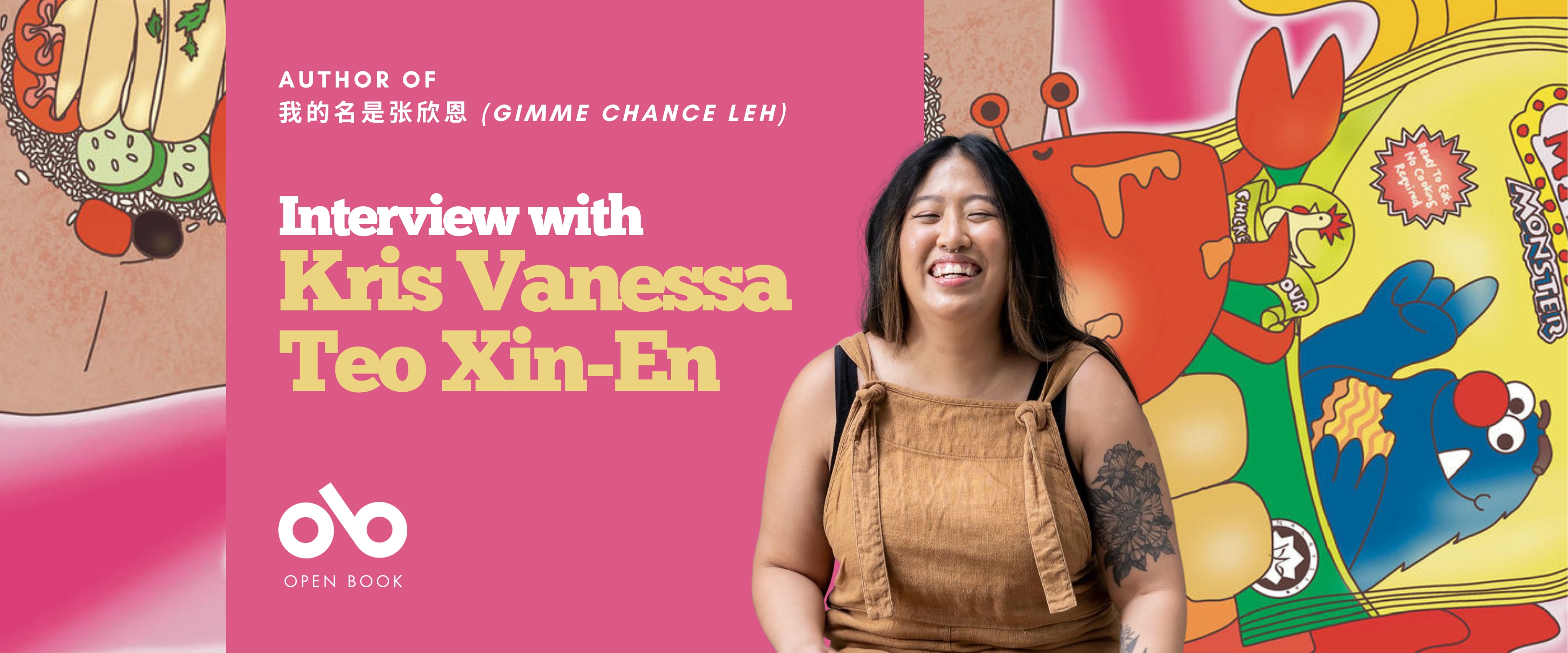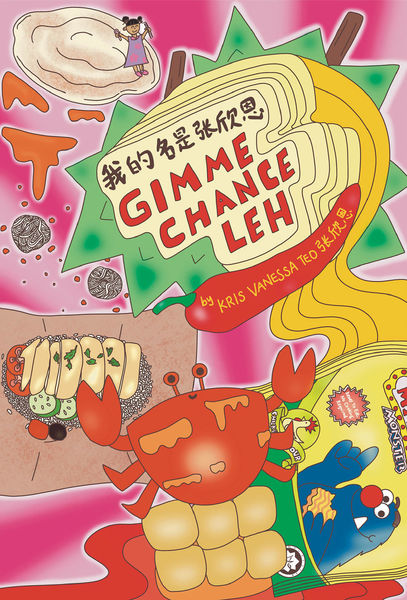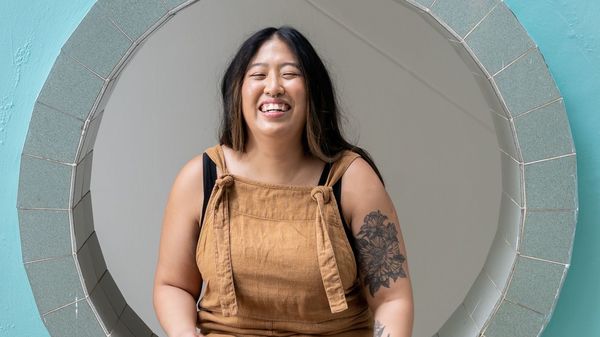Kris Vanessa Teo Xin-En's New Cross-Cultural Drama Warms Hearts and Challenges Stereotypes
Prolific artist Kris Vanessa Teo Xin-En has shown vast range in her career as a playwright, performer, director, producer, and co-artistic director, and her latest work is a cross-cultural drama about a young woman attempting to reconcile with her Canadian and Singaporean roots. The story weaves expertly between languages and contrasting societal standards, confronting stereotypes along the way.
Inspired by observing the community around her, the author journaled about some of the elements that would become central to the work, and then went on to let these seeds drive her live performances. It was later that she wrote them into the heartwarming and poignant 我的名是张欣恩 (Gimme chance leh) (Playwrights Canada Press).
We're delighted to share this excellent Behind the Curtain interview with the author right here on Open Book, and to learn more about this fantastic new drama.
Open Book:
How did this play first come to life for you? Do you remember the first bit of writing you did for it?
Kris Vanessa Teo Xin-En:
我的名是张欣恩(Gimme chance leh) was seeded in a cluster of trees, where there was bubble blowing and sparkling sparklers. I had unexpectedly agreed to participate in a site-specific performance tour that Swallow-a-Bicycle Theatre used to host and mentor annually.
I chose a cluster of trees in the park to create my performance in, where I had spent some time sitting in and where I remember feeling cozy, playful, and protected by the trees. I recall journaling about what it meant to feel comfortable. There was a realization that I hadn’t felt comfortable within myself for a long time, and that there was something about being in Calgary that didn’t allow me to feel comfortable being myself. I decided to run with this personal and intimate self discovery to create my performance.
I remember sitting in the park journaling a lot. But I didn’t think of those early bits of writing as actual writing, more so a journaling exercise to crack into myself and distill whatever I found into my creative process. I loosely decided on utilising that feeling of comfort I felt from being with the trees, to nurture my internal sense of safety to share with an audience the parts of myself that I hadn’t been comfortable with. The parts about being Chinese, being Singaporean, being “not from here”, all the parts of myself that had been injured from the implicit and explicit messages that being Chinese was not valued, best kept hidden or something to be made fun of.
I was also inspired by the children playing in the park to embody the unabashed ways they tend to carry themselves when meeting new people. I used this childlike character to befriend the audience in the park in Mandarin, and later taught them to write the characters of my Chinese name. It was the first time since moving to Calgary where I called my Chinese name back to me, back into existence and let people witness me speak and write my mother tongue.
The pillars of this first iteration were loosely jotted down in a notebook, but the performance was mostly improvised. It was only much later in the development process that I started writing down the words I was performing.
Your CanLit News
Subscribe to Open Book’s newsletter to get local book events, literary content, writing tips, and more in your inbox
OB:
Was there a question you were exploring in this work, and if so, did you know what it was when you started writing?
KVTXE:
In my initial years in Calgary, I had so many conversations with others that would get derailed by their fixation on my accent and how I spoke. It made me feel a lot of shame around how I grew up speaking.
Because of this, I wanted to explore performing in all my different accents and languages in its full glory. I speak Mandarin, but also Singlish - English, but blended with the multiple other languages spoken in Singapore into an informal slang. Singaporeans also have a very distinct, tonal accent when they speak. Writing and performing GCL in the languages I was raised to speak was the starting point of me rebuilding my relationship to my cultural identity. This aspect of language and accent were present from the moment of GCL’s inception and remained for all of the development process.
Some ideas that were sparked and massaged later in the writing process were about the shifting dynamics of power and privilege that race, language, beauty standards can wield in different communities and its corresponding dominant culture. This was explored through lots of honest sharings and conversations within the creative team that were all racialised. Having that space really exemplified how important affinity spaces are, and how some conversations can only fully unfold itself with the absence of whiteness in the room. These conversations provided more dimension to the story I wanted to tell and supported me in being more honest with myself about what my lived experience of being a Chinese woman in Calgary was. Even the parts my current self is not so proud of. My learning and my writing were both happening and informing each other in a very live way.
OB:
Did the script change in any way once you were rehearsing?
KVTXE:
I am both the playwright and performer of GCL. It was hard to focus on one task at a time while writing or in rehearsal. I would be writing but thinking about performance or be in rehearsal but thinking about edits I wanted to make in the script! There’s also lots of Singlish in the play, and I was more used to speaking it than writing it. I might have written it and memorized it a certain way but in rehearsing the performance of it, I would discover edits that had to be made to more accurately reflect the speaking of the language.
There are also plenty of language and accent shifts within the play, and while rehearsing I would second guess when the shifts should happen and want to change it in the script. This looked like writing or rewriting monologues of text from English to Singlish or from Singlish to English. And honestly, other playwrights might also feel this way, but I could probably edit forever! If no one gave me a deadline, I would never be done writing. Thankfully, I had Jenna to constantly remind me that to perform or to publish my writing is simply to capture the work in its most current state! It helps me let go of wanting to make changes inappropriately late in the process ;)
While in the writing process though… LET GO OF PERFECTIONISM!!! JUST WRITE THE DAMN THING YOU WANNA WRITE!!! (what I’m yelling at myself when I write)
OB:
Which of your characters do you feel most connected to in this work, and why?
KVTXE:
The main character in this play is deeply informed by my lived experience. So of course I feel the most connected to her. She is named Kris, after all! In the process of writing my play, I got to revisit younger versions of myself, sit with them and the feelings I had and uncover the parts of myself that I chose to hide for so long. Through my writing, I was able to confront my shame with compassion and reclaim those parts of my identity.
But I also do have a special spot in my heart for The Chicken Rice Uncle. For most of my life, I was always nervous about ordering my own food at the hawker centres in Singapore, even to this day! It’s the mix of the hawkers' often gruff and loud way of speaking, the bustle of the street food environment, the urgency of needing to order swiftly and efficiently, the self awareness that I don’t know how to speak any dialects and the lack of confidence in my Mandarin. But every now and then, I would encounter a hawker uncle or auntie who was patient, kind or would gently tease me about my language, or lack thereof, in a way that gave me much more resilience to move through the awkwardness and discomfort of not speaking the same language. The Chicken Rice Uncle character embodies the sweet patience of all of these uncles and aunties that I wish had been a more common occurrence for my kid self.
OB:
Do you have a community as a playwright? If so, tell us a little bit about how you found them and the role they play in your writing.
KVTXE:
When I tell people I'm from Calgary, I’m often asked why I’m still here. There’s a perception that Calgary is a barren and harsh environment for artists, that it’s only a place for white, conservative, oil rigging corporate-cowboys. This perception isn’t…not true, especially for the racialized, queer, disabled, poor, neurodiverse artists who are invested in not just our own individual liberation, but liberation for all. But it is these same harsh conditions that have created such a fertile ground of indie artists, collectives and organizations that respond with such intention, care and joy that the resulting art that gets made often feels like a powerful antidote and radical act of love for this place. I feel so proud to be part of Calgary’s art making ecology of performance creators, visual artists, musicians, movement practitioners, audiovisual designers, writers, crafters, curators…the list could go on. As with any community, there are its own points of contention of course, but I really believe in the power and importance of the stories that come from this community.
I also want to specifically mention Chromatic Theatre - where I found community and an artistic home for GCL. My first encounter with Chromatic Theatre was attending their Reading Rainbow meetings - a play reading series exclusively for artists of colour to meet over good food and read aloud plays written by culturally diverse artists. It was such a lovely space to get familiar with the canon of culturally diverse works in Canada while building relationships with one another. It is how I met Jenna Rodgers, who was the one who encouraged me to think about expanding my silly little site-specific performance in a park into a play. She later became the dramaturg and director for GCL and is someone I consider a dear friend. It was through more Chromatic Theatre programming that I eventually connected with and built more relationships with many other BIPOC artists and it has been very cool to witness how the community fostered by Chromatic Theatre has expanded so much!
______________________________________________
Kris Vanessa Teo Xin-En (张欣恩) is a Singaporean Chinese settler based in Moh’kins’tsis, Treaty 7 territory // Calgary, Alberta. She moves between many roles, such as playwright, performer, director, producer, and co-artistic director at Swallow-a-Bicycle Theatre. Kris’s artistic curiosities come alive at the intersections of food, self-inquiry, and in-betweenness while working with a slow-cooked blend of care, anti-racist, and anti-oppressive values, inviting mutual presence and exploration. She moves, thinks, and writes slowly.






